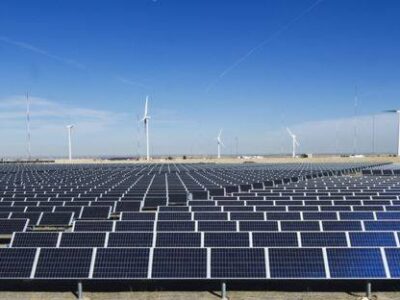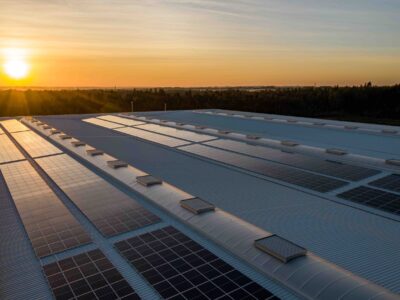The sun is up, and the skies are blue when it comes to clean energy potential in America. The solar industry alone added 156,000 jobs in the past decade, up 167 percent. From 2014 – 2019, solar jobs grew five times faster than the rest of the US economy. For veterans entering the civilian workforce following their military service, the solar industry is a bright shining field of opportunity. From the US Department of Energy’s Solar Ready Vets pilot program to the current Solar Ready Vets Fellowship in partnership with U.S. Chamber of Commerce Foundation’s Hiring Our Heroes, to the Solar Opportunities and Readiness (SOAR) Initiative, efforts to invest in the rich potential veterans bring to the job are paying off.
The Morale is High
After 27 years in the Air Force, Sylvia Morris was looking for a transition into civilian life that would keep her as engaged as her military service. “I lucked out,” she told us, “I like to be busy, I get bored easily, so I decided to check out the Hiring our Heroes program, and somehow I was linked to Energy Toolbase. My introduction to the company has been amazing. I just started my fifth week, and I’m highly impressed.” Morris’ background is in supply chain logistics; she says the only experience she has in solar energy is what she learned back in high school. But at Energy Toolbase, a SaaS platform for solar energy storage, she’s getting the training she needs to succeed. “Everybody is friendly and willing and able to help. The morale is extremely high.”
Veterans now comprise 7.8 percent of the solar industry, a significant increase from their 6.6% representation in overall national employment. That’s not to say there isn’t plenty of room to grow. Currently, only 17 percent of US solar companies have implemented strategies to attract and develop veterans for their workforce, according to the U.S. Solar Industry Diversity Study 2019. “As we create new opportunities in the Solar+ Decade, we need to be keenly aware of who is benefiting from the jobs that we create,” said Abigail Ross Hopper, president and CEO of the Solar Energy Industries Association (SEIA), in a press release on two new solar workforce development programs. “Veterans are leaders and can help inspire confidence in the industry and navigate our most pressing challenges. Diversity and inclusion continue to be a top priority for SEIA, and we’re thrilled to work with solar companies to make even more employment opportunities available to Americans that have sacrificed the most.”
Leading with Veterans
One of those companies is Strata Solar, a turnkey solar provider out of Chapel Hill, North Carolina, boasting over 1.5GW installed and more than 3.5GW in their development pipeline. Launched in 2008 in the residential solar thermal market, Strata eventually transitioned into commercial rooftop PV. The company is now an industry leader in full-scale utility solar projects. Michael Carrington, human resources training manager at Strata, said in a recent SEIA webinar: “Veterans bring a unique set of skills, including leadership and teamwork. They’re trained leaders. They understand things such as safety and how to implement and formulate a team to get in gear to get a particular goal completed. They also bring a great work ethic. They’re able to adapt to changing environments and situations. Military personnel are taught to exercise collaboration, cooperation, and personal development in order to achieve their goals.”
Strata has hired upwards of 80 veterans across full-time and contract roles in partnership with Solar Ready Vets through the U.S. Department of Energy’s SunShot initiative, and now with SEIA and The Solar Foundation’s joint initiatives, continuing the work of the Solar Ready Vets pilot program by providing classroom and hands-on training to veterans and transitioning service members. Community colleges and tech schools also play a big role in Strata’s veteran employment outreach through job fairs and direct collaboration with graduating classes.
Strata is now formalizing a partnership with Tidewater Community College in Virginia. Dominic Kolleh, talent acquisition manager at Strata, said: “One thing that’s always been important to us as a company is to connect with the local communities in which we’re building, whether that be supplying jobs or offering some type of support retraining program. Our partnership with Tidewater has really been the perfect marriage of our initiative to bring on more military veterans in connection with those local communities. We’re hoping to assist them with curriculum development, and hopefully, build out some type of apprenticeship program with them.”
For companies looking to grow their veterans’ workforce, Kolleh and Carrington have some advice. Train your hiring team in reviewing military resumes so as not to miss transferable skills that veterans offer. Collaborate with a local community college or Solar Ready Vets program to coach veteran candidates as they prepare for their interviews. Once they’re hired? “We found that it’s imperative to have structure and organization to support these transitioning veterans in regards to career planning and development,” Kolleh explained, “We always have to be ready to let them know what that next step in their career path could look like.”
The Veteran Perspective
A 2020 graduate of the Solar Ready Vets fellowship program, Captain Kathrine Lukes is now operation manager at Icarus RT. She joined Strata, SEIA, and The Solar Foundation in a panel discussion on hiring veterans in solar, where she shared some sage advice: “The worst thing that you could do for a veteran is not give them feedback, not tell them how they’re doing. There is a big transition, especially for newly transitioning service members, in the mental game on how things need to happen in the workplace. Give them a solid framework to start with because we’re all really good when you give us directions, and we’re going to go and get things done. Growing up in the Marine Corps, or in all services of the military, we have a lot of people telling us this is good, this is bad. And that’s what we’d like to see.” Lukes is quick to point out that this is standard practice for most companies, with employee reviews and operations oversight measuring productivity and outcome, so it’s not that veterans need to be treated differently per se, but an understanding of their mission-driven background is key to long-term success.
Jim J. Purekal spent the majority of his time in the Marine Corps flying CH-46 helicopters for assault support missions. Now he’s handling market development and policy for SunPower Corporation. “Starting a new career after 20 years of military service can be a daunting experience. The Solar Ready Vets Program and the Hiring our Heroes Corporate Fellowship have made the transition so much easier,” he told us. “The ability to spend 12 weeks with SunPower Corporation while still on active duty is a win-win for everyone involved and has given me a leg up on achieving my goal of increasing access to clean and renewable energy.”
Partnering with Solar Ready Vets
The Solar Foundation, in partnership with the U.S. Chamber of Commerce Foundation’s “Hiring Our Heroes,” the North American Board of Certified Energy Practitioners (NABCEP), and the Solar Energy Industries Association (SEIA), is offering the Solar Ready Vets Fellowship to make possible a smooth and successful transition from active duty to the civilian workforce, placing qualified servicemembers with solar employers for twelve weeks of on the job training. With funding from the US Department of Energy, The Solar Ready Vets Fellowship extends the Corporate Fellowship Program, led by Hiring Our Heroes, to the solar industry. The fellowship program is designed for mid and senior-level service members entering into professional and management level roles. Because many of these highly skilled individuals may not have a background in solar, the program includes a “Solar 101” curriculum offering a thorough orientation to the technology, policy, and market dimensions of the industry. As the Solar Ready Vets Fellowship is a Department of Defense Skillbridge Program, the military service member remains on active duty throughout the fellowship, continuing to draw their salary, and there is no cost to the employer. For solar employers who would like to host a Solar Ready Vets fellow, the next cohort begins in January and the deadline to apply is October 23. More information about the application and placement process is available here.





